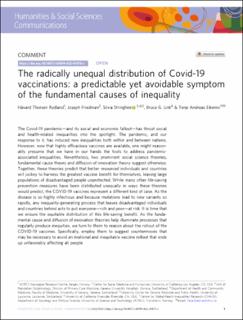| dc.contributor.author | Rydland, Håvard Thorsen | |
| dc.contributor.author | Friedman, Joseph | |
| dc.contributor.author | Stringhini, Silvia | |
| dc.contributor.author | Link, Bruce | |
| dc.contributor.author | Eikemo, Terje Andreas | |
| dc.date.accessioned | 2022-02-24T13:59:38Z | |
| dc.date.available | 2022-02-24T13:59:38Z | |
| dc.date.created | 2022-02-23T13:41:58Z | |
| dc.date.issued | 2022 | |
| dc.identifier.citation | Humanities & Social Sciences Communications. 2022, 9: 61 | en_US |
| dc.identifier.issn | 2662-9992 | |
| dc.identifier.uri | https://hdl.handle.net/11250/2981281 | |
| dc.description.abstract | The Covid-19 pandemic—and its social and economic fallout—has thrust social and health-related inequalities into the spotlight. The pandemic, and our response to it, has induced new inequalities both within and between nations. However, now that highly efficacious vaccines are available, one might reasonably presume that we have in our hands the tools to address pandemic-associated inequalities. Nevertheless, two prominent social science theories, fundamental cause theory and diffusion of innovation theory suggest otherwise. Together, these theories predict that better resourced individuals and countries will jockey to harness the greatest vaccine benefit for themselves, leaving large populations of disadvantaged people unprotected. While many other life-saving prevention measures have been distributed unequally in ways these theories would predict, the COVID-19 vaccines represent a different kind of case. As the disease is so highly infectious and because mutations lead to new variants so rapidly, any inequality-generating process that leaves disadvantaged individuals and countries behind acts to put everyone—rich and poor—at risk. It is time that we ensure the equitable distribution of this life-saving benefit. As the fundamental cause and diffusion of innovation theories help illuminate processes that regularly produce inequities, we turn to them to reason about the rollout of the COVID-19 vaccines. Specifically, employ them to suggest countermoves that may be necessary to avoid an irrational and inequitable vaccine rollout that ends up unfavorably affecting all people. | |
| dc.language.iso | eng | en_US |
| dc.rights | Navngivelse 4.0 Internasjonal | * |
| dc.rights.uri | http://creativecommons.org/licenses/by/4.0/deed.no | * |
| dc.title | The radically unequal distribution of Covid-19 vaccinations: a predictable yet avoidable symptom of the fundamental causes of inequality | en_US |
| dc.type | Peer reviewed | en_US |
| dc.type | Journal article | en_US |
| dc.source.articlenumber | 61 | |
| dc.description.version | publishedVersion | |
| cristin.ispublished | true | |
| cristin.fulltext | published | |
| cristin.qualitycode | 1 | |
| dc.identifier.doi | 10.1057/s41599-022-01073-z | |
| dc.identifier.cristin | 2004841 | |
| dc.source.journal | Humanities & Social Sciences Communications | en_US |
| dc.source.volume | 9 | en_US |
| dc.source.issue | 1 | en_US |
| dc.relation.project | Norges forskningsråd: 288638 | |

